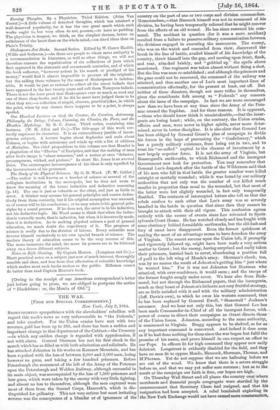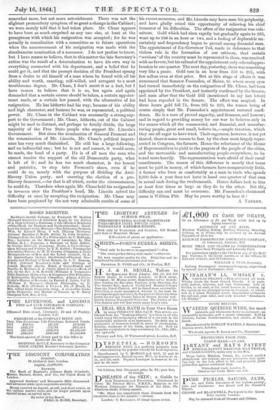four guns, which were taken by the enemy with verylittle
fighting, On Thursday Wall Street and all places the country over where and almost no loss to themselves, although the men captured were merchants and financial people congregate were startled by the most of them from the Second Corps, Hancock's, which is dis- announcement that Secretary Chase had resigned, and that his tinguished for gallantry. This not very serious but most irritating resignation had been accepted. A rebel bombshell exploding in reverse was the consequence of a blunder or of ignorance of the the New York Exchange would not have caused more consternation,
Plato's Trinity. the divisions engaged in executing the manoeuvre. The enemy, who was on the watch and concealed from view, discovered the break in the line of battle, availed himself of his knowledge of the country, threw himself into the gap, and moving upon front, flank,
first appeared In the sixteenth and seventeenth centuries, and of which and rear, attacked briskly, and "gobbled up " the spoils above the book collector, " however ardent in his search or prodigal of his mentioned. One regiment was taken almost without firing a shot. money," would find it almost impossible to procure all the originals; But the line was soon re-established ; and although the prisoners and but the calling these volumes by the name of Shakespeare is indefen- the guns could not be recovered, the command of the railway was Bible. It would be just as rational to collect all the street ballads that attained, and thus another one of Lee's most important lines of have appeared in the last twenty years and call them Tennyson ballads. communication effectually, for the present at least, cut off. But There is not the least proof that Shakespeare ever so much as read any neither of the disasters, though not mere trifles in themselves, one of theso chap-books, and if he did ho must have judged them to be gives the considerate folk among us " Federals" any concern what they are,—a collection of stupid, obscene, practical jokes, in which about the issue of the campaign. In fact we are more enconraged the point, when by any chance there happens to be a point, is always now than we have been at any time since the Army of the Poto-
spoiled. mac crossed the Rapidan. And for these reasons. It is apparent, One Hundred Lectures on God, the Creator, the Creation, Astronomy, —those who should know think it unmistakeable,—that the insur- gents are losing heart ; while, on the contrary, the Union armies, officers and men; were never in higher spirits, never more deter- reined, never in better discipline. It is also clear that General Lee has been obliged by General Grant's plan of campaign to divide
Colenso, or begins with astronomy and winds up with a list of editions his forces in the hope of preventing the " Confederacy," which of 2Eschylus. The chief propositions in this volume are that Hamlet is has a purely military existence, from being cut in two, and to a plagiarism of the "Electra" of Euripides, and that the making of man trust his "so-called " capital to the chances of investment by a after God's imago is "sheer nonsense," and a notion at once "delusive, now largely superior force. It is not thenrmy of Virginia, but presumptuous, wicked, and profane." In short Mr. Jones is an avowed Beauregard's earthworks, to which Richmond and the insurgent Deist. The extravagant inconsequence of his ideas is only equalled by Government now look for protection. You may •remember that the incorrectness of his grammar. General Lee's despatch after the battle of the Wilderness said that The Study of the Physical Sciences. By G. D. Wood. (F. W. Calder.) of his men who fell in that battle the greater number were killed —The author is well known as a teacher of science at several of the outright or mortally wounded ; while it was found by our military authorities that not only was the number of our killed much
smaller in proportion than usual to the wounded, but that most of the latter were but slightly wounded, in fact only temporarily matter to Grant ; but the enemy, having surprised and easily taken their prisoners, hurried back to cover, abandoning a position full of peril to the left wing of Meade's army. Sherman's check, too, are so little satisfied with it and with the military administration THE WAR. (Jeff. Davis's own), to which he owes his western command, that
[FROM OUR SPECIAL CORRESPONDENT.] he has been replaced by General Ewell, ".Stonewall " Jackson's
New York, July 2, 1864. successor. And we hear not only this, but that General Lee has somewhat more, but not more astonishment. There was. not the slightest premonitory symptom of so great a change in the Cabinet ; we were merely told that it had taken place. Mr. Chase appears to have been as much surprised as any one else, at least at the promptness with which his resignation was accepted ; for he was actually in consultation with a committee as to future operations when the announcement of his resignation was made with the simultaneous nomination of a successor. I do not profess to know, but I have reason to believe, that in thismatter the late Secretary's action was the result of a determination to have his own way in everything connected with his department, and a belief that he could get it, and that the prompt decision of the President sprang from a desire to rid Mr' nself of a man whom he found with all his ability and worth, exacting, self-willed, and arrogant to a most troublesome degree. Mr. Chase, I don't assert it as a fact, but I have reason to believe that it is so, has again and again demanded that a certain course should be taken, a certain appoint- ment made, or a certain law passed, with the alternative of his resignation. He has hitherto had his way, because of his ability and high character, and because he was, or represented, a political power. Mr. Chase in the Cabinet was necessarily a strong sup- port to the Government ; Mr. Chase, hitherto, out of the Cabinet might be used to distract, and perhaps to fatally divide, the largo majority of the Free State people who support Mr. Lincoln's Government. But since the nomination of General Fremont and the renomination of Mr. Lincoln, Mr. Chase's political import- ance has very much diminished. He still has a large following, and an influential one ; but he is not and cannot, it would seem, be made, the head of a party. He is of all men the man who cannot receive the support of the old Democratic party, what is left of it ; and he has too much character, is too honest and patriotic, to step into Fremont's shoe; even if he could do so, merely with the purpose of dividing the Anti- Slavery Union party, and ensuring the election of a pro- Slavery democrat,—for that is all which, under the circumstances, he could do. Therefore when again Mr. Chase held his resignation in terrorem over the President's head, Mr. Lincoln solved the difficulty at once by accepting the resignation. Mr. Chase may have been perplexed by the not very admirable results of some of
his recent measures, and Mr. Lincoln may have seen his perplexity, and have gladly seized this opportunity of relieving his chief treasurer of his difficulties. The effect of the resignation was cala- mitous. Gold which had risen rapidly but gradually again to 285, went up:to 250 in an hour or two, and a feeling of deplorable un- certainty and despondency began to prevail among financial men. The appointment of Ex-Governor Tod, made in deference to that vicious rule in the formation of our cabinets, that certain i'sections" of the country must be represented in them, was received with no favour, but his refusal of the appointment only relieved appre- hension in one quarter. The next day,yesterday, there was something very like a panic. Gold rose in an hour from 250 to 285, with few sellers even at that price. But at this stage of affairs it was announced that Senator Fessenden, of Maine, to whom many eyes had turned immediately on the resignation of Mr. Chase, had been appointed by the President, and instantly confirmed by the Senate, and soon After that the Gold Bill (mentioned in my last letter) had been repealed in the Senate. The effect was magical. In three hours gold fell 75, from 285 to 210, the reason being of course simply that Mr. Fessenden's appointment restored confi- dence. He is a man of proved sagacity, and firmness, and honour; and in regard to providing money for our war he believes only in the means which all the commercial, and financial, and manufae., • turing people, great and small, believe in,—ample taxation, which they are all eager to have tried. Their eagerness, however, is not yet shared, there is some reason to fear, by the class most largely repre- sented in Congress, the farmers. Hence the reluctance of the House of Representatives to yield to the prayers of the people of the cities, and the mercantile and manufacturing people everywhere, to be taxed more heavily. The representatives were afraid of their rural constituents. The reason of this difference is merely that taxes must be paid in money, of which farmers have comparatively little. A farmer who lives as comfortably as a man in trade who spends 2,000 dols. a year does not have in hand one-quarter of that sum in actual cash during the twelvemonth. Hence dollars look to him at least four times as large as they do to the other. But this difficulty can and must be overcome. Mr. Fessenden's christened name is William Pitt. May he prove worthy to bear it !
A YANKEE.































 Previous page
Previous page